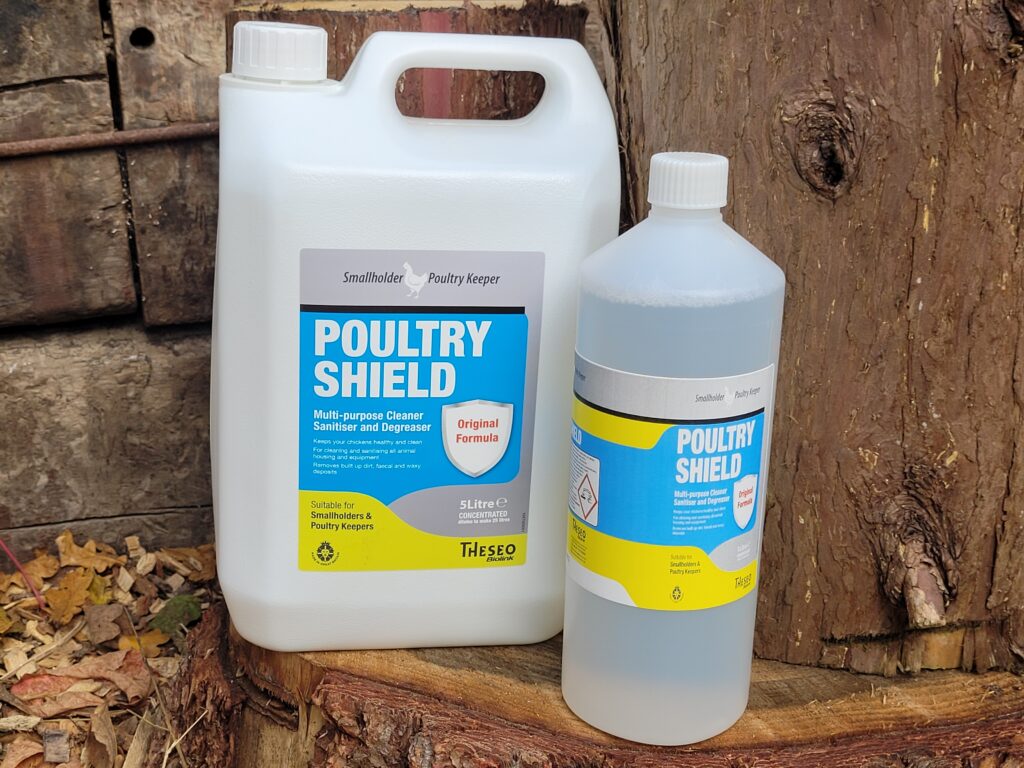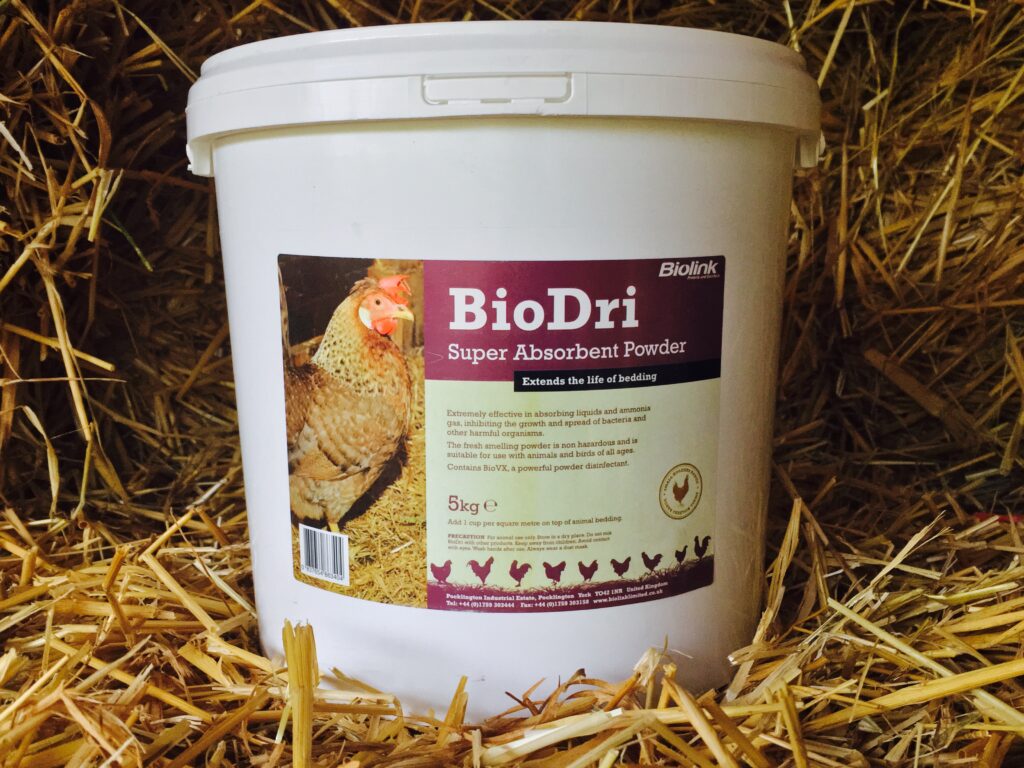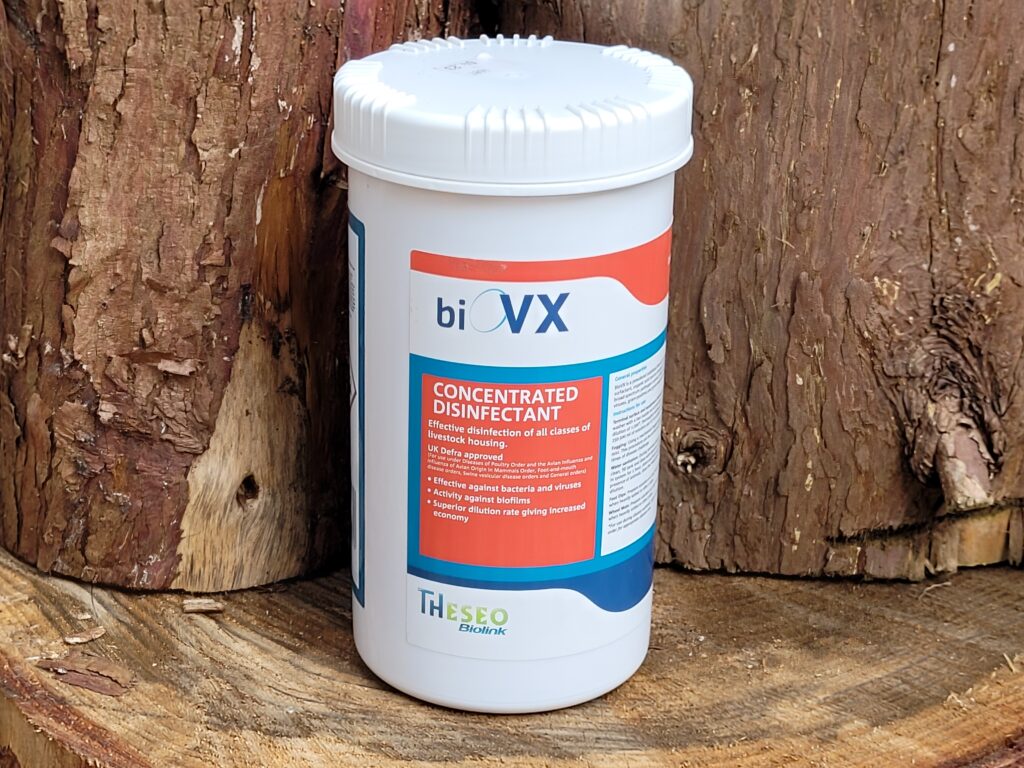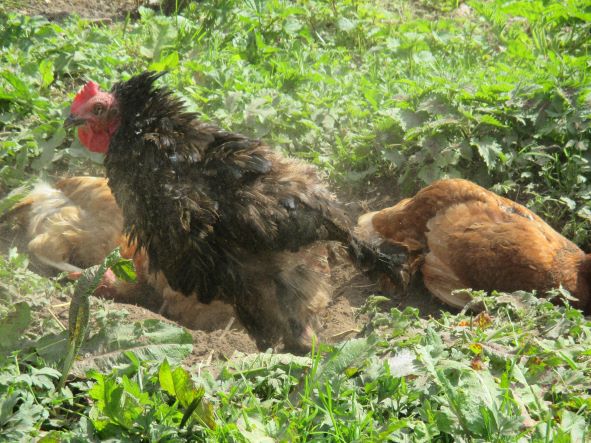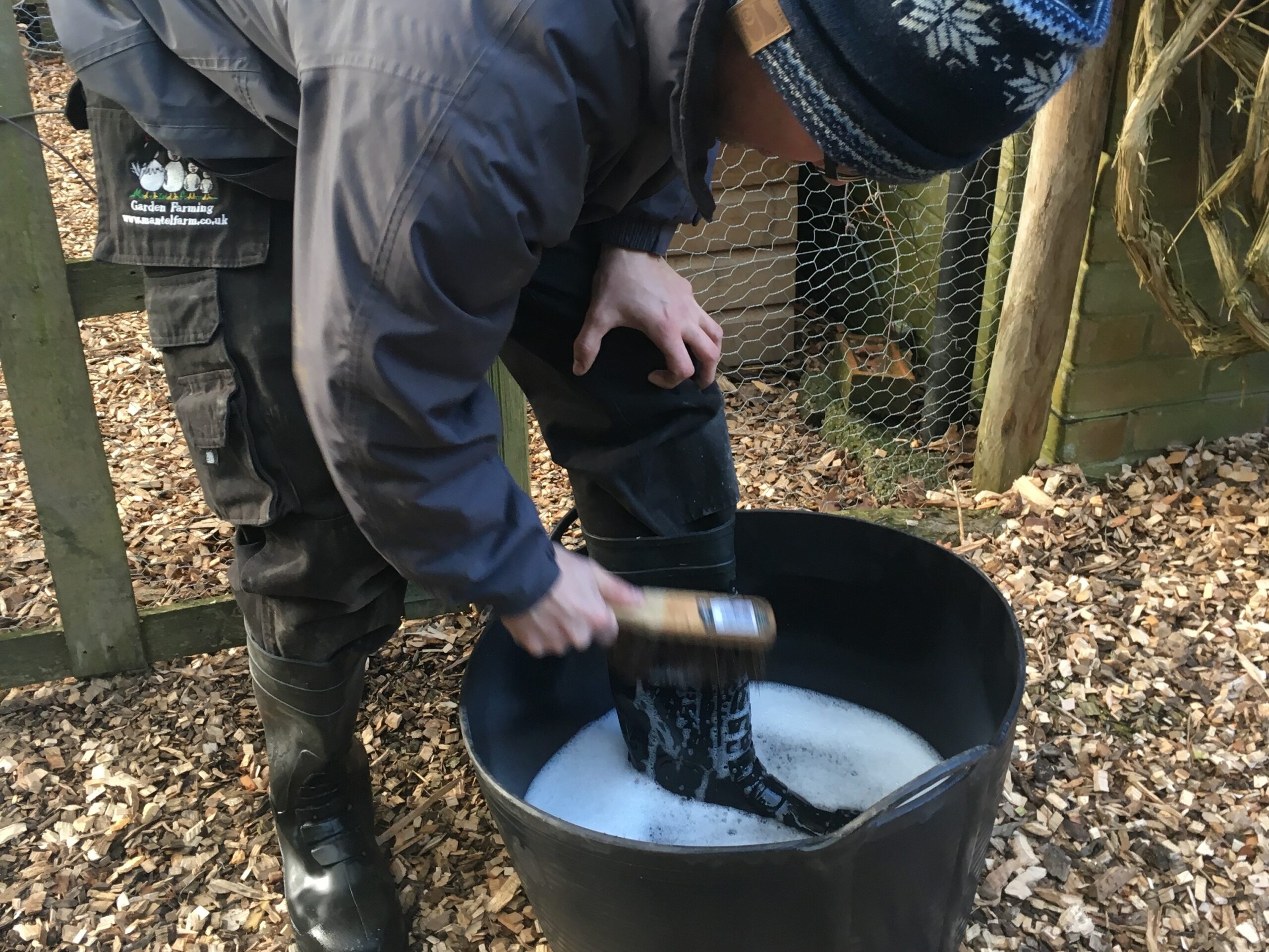
Minimize movement in and out of bird enclosures:
There is no need to stop enjoying time with your flock, however, plan your visits. Combine visits with essential care such as providing food and water, checking all is well and egg collecting. Always practice good hygiene.
Clean footwear before and after visiting birds, using a Defra-approved disinfectant at entrances & exits:
Set up a simple footbath near the entrance to your chicken run (a large bucket or tub-trug is ideal) with a solution of Defra-approved disinfectant. We recommend BioVX, a UK Defra-approved powder. A separate set of footwear is also advisable and keeps things really simple. Keep the solution clean, changing regularly.
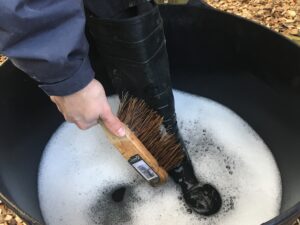
Keep areas where birds live clean and tidy, and regularly disinfect hard surfaces such as paths and walkways:
Keeping any livestock area clean and tidy is key to good poultry health, not only will it meet the Defra requirements, but it will make their care more pleasurable and help to prevent all poultry pests and diseases.
There are many disinfectants available for poultry keepers and being conscious of the environment we have always recommended the more natural products available, steering away from the unnecessary use of harsh chemicals. This we continue to do and our recommended products for general day-to-day cleaning are Poultry Shield and BioDri. However, there is a place for stronger disinfectants and periodically (say monthly) you should give the poultry house a thorough clean with a Defra-approved product such as Bi0 VX.
Keeping the ground of your pen clean and dry, also plays an important part in maintaining the biosecurity and comfort of your birds. No birds are happy in wet muddy conditions. A simple answer is to provide a thick layer of woodchips across the run. This gives the birds a surface to scratch around in and keeps the floor dry, so making it easier for your access also. We recommend applying BioDri to the outside pen, this super-absorbent powder extends the life of the bedding and is a fresh-smelling powder that is non-hazardous.
Application of Poultry Shield:
Make a litre of solution by adding 200ml of Poultry Shield concentrate to 800ml of water. To clean, sanitise and odour neutralise your coop:
Remove old bedding and excess litter
Spray interior areas and equipment with poultry shield solution. Pay particular attention to the roof structure, joints, cracks, crevices and perches.
Leave to soak for 1 hour, then brush clean.
Application of BioDri:
A fresh smelling non-hazardous powder suitable for use with animals and birds of all ages.
This powder is extremely effective in absorbing liquids and ammonia gas, inhibiting the growth and spread of bacteria and other harmful organisms.
Add 1 cup per square meter on top of the animal bedding.
Application of BioVX:
BioVX is broad spectrum and effective against bacteria, fungi, yeasts and all known classes of virus. Being Defra approved and bio-degradable, its superior dilution rates make it a highly cost-effective solution for foot baths.
Dilute 1:200 in a suitable container to act as a footbath.
Humanely control rats and mice:
Preventative measures for rodent control are essential, being able to act early, knowing how to prevent and control a rodent infestation is key. New laws came into effect in April 2016, restricting certain rodenticides to professional certified users only. This has meant a change to the products available for ‘garden farmers’ to purchase. Pack sizes are now limited to 1.5kg, however, we can still offer a range of products including bait stations, pastes and blocks. With a controlled approach, these pack sizes should be enough to keep rodents under control, and if they are not successful a professional pest controller should be consulted. More information can be found on the CRRU website: www.thinkwildlife.org
Place bird food and water in fully enclosed areas protected from wild birds, and remove any spilled feed regularly:
Ensure the feed and water containers are placed undercover to prevent access or contamination by wild birds. Placing feed on the ground or in uncovered troughs to which wild birds can gain access is not permitted.
Set up a fully enclosed run adjacent to your poultry house, ideally, with a solid (e.g. Onduline) roof, otherwise cover in netting or willow screening. Screening also works well around the sides of the run, preventing wild birds from accessing larger mesh.
Spilled feed can be kept at a minimum by using a purpose-made poultry feeder. We recommend the types that are filled from the top with anti-scratch fins around the base. Avoid mixing your feed, birds are selective and will pick out the best bits, flicking the other on the floor. Keep corn as a treat, fed separately from the main feed. Feeders with adjustable fin height mean you can also restrict the flow of feed to minimize wastage. Where possible always hang your feeder, if this is not possible then place the feed off the floor on bricks or concrete blocks. Don’t forget to regularly clean your drinkers and feeders, Poultry Shield is ideal for doing so.
Keep a close watch on birds for any signs of disease and report any very sick birds or unexplained deaths to your vet:
Bird flu is a notifiable animal disease. If you suspect any type of bird flu you must report it immediately by calling the Defra Rural Services Helpline on 03000 200 301.
If you keep poultry, you should keep a close watch on them for signs of disease, and maintain good biosecurity at all times. If you have any concerns about the health of your poultry, seek prompt advice from your vet.
How to spot avian influenza:
There are 2 types of avian influenza.
Highly pathogenic avian influenza (HPAI) is the more serious type. It is often fatal in birds. The main clinical signs of HPAI in birds are:
- Swollen head
- Blue discoloration of neck and throat
- Loss of appetite
- Respiratory distress such as gaping beak, coughing, sneezing, gurgling, rattling
- Diarrhoea
- Fewer eggs laid
- Increased mortality
Clinical signs can vary between species of bird and some species (for example ducks and geese) may show minimal clinical signs.
Low pathogenic avian influenza (LPAI) is usually less serious. It can cause mild breathing problems, but affected birds will not always show clear signs of infection.
The severity of LPAI depends on the type of bird and whether it has any other illnesses.
Please remember the above signs are guidance only, and unfortunately many of them are common in other poultry issues and behavior – for example ‘Fewer laid eggs’ can simply mean the bird is having a rest, moulting or it is a breed that just goes off lay in the winter.
So, our advice is: don’t panic, but know your flock, enjoy your birds, and act responsibly.
Reporting suspected bird flu in poultry or captive birds
If you suspect any type of bird flu in poultry or captive birds you must report it immediately by calling the Defra Rural Services Helpline on 03000 200 301. In Wales, contact 0300 303 8268. In Scotland, contact your local Field Services Office. Failure to do so is an offence.
Reporting dead wild birds
You should call the Defra helpline (03459 33 55 77) if you find:
- one or more dead bird of prey or owl
- 3 or more dead gulls or wild waterfowl (swans, geese and ducks)
- 5 or more dead birds of any species



